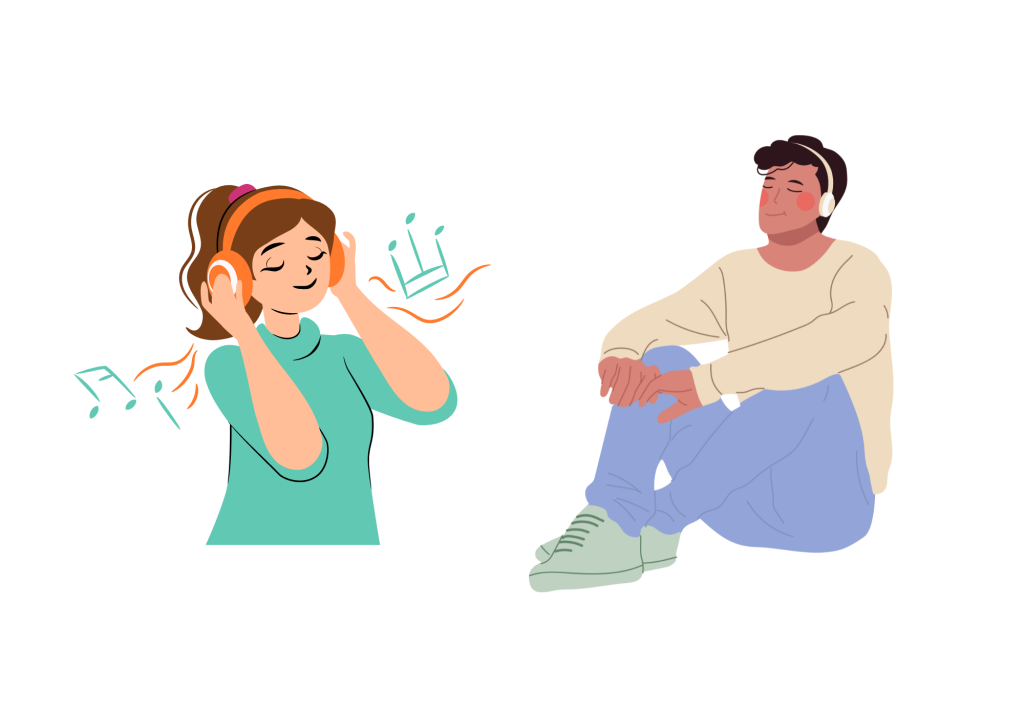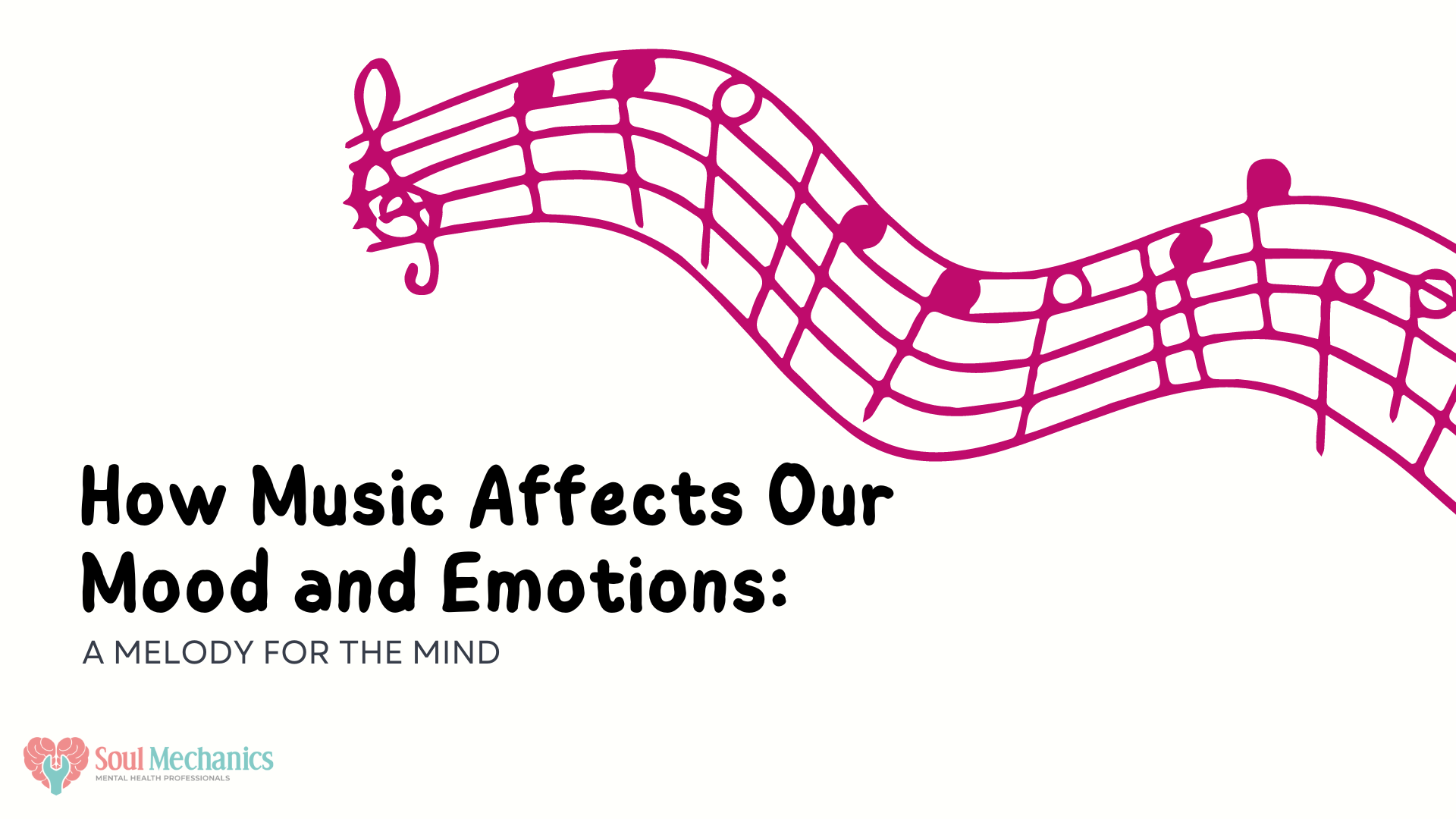How Music Affects Our Mood and Emotions: A Melody for the Mind
How Music Affects Our Mood and Emotions: A Melody for the Mind
Written By: Sin Tze Ean Cyan (Clinical Psychology Trainee)

Verified By: Kelly Chan Jia Li, Clinical Psychologist (MAHPC(CP)00353)
Have you ever felt a little low but then turned on an upbeat song and noticed yourself smiling and feeling happy? Or have you cried listening to an emotional ballad? From singing lullabies to soothe babies to anthems that rally nations, music has a profound impact on our moods and emotions. But how exactly does music influence us? Let’s dive into the fascinating world of music and explore how it shapes our emotional landscape.

How Music Affects Emotions?
Eliciting Emotional Responses
- Happiness and Joy: Upbeat and fast-paced music often evokes happiness and excitement. Songs with lively rhythms can lift our spirits and make us feel more energetic.
For example, listening to Pharrell Williams’ “Happy” can instantly make you smile and make you want to dance.
- Sadness and Melancholy: Slow music with a sombre tone can evoke sadness or nostalgia. These songs can provide a safe space for emotional release.
For example, Adele’s “Someone Like You” often brings tears to listeners’ eyes, as the melancholy melody and heartfelt lyrics touch on themes of loss and longing.

- Calm and Relaxation: Soft, soothing music with gentle melodies can help reduce stress and promote relaxation. This type of music is often used in therapeutic settings.
For example, classical pieces like Debussy’s “Clair de Lune” or ambient music by artists like Brian Eno are perfect for unwinding after a stressful day.
Enhancing Motivation
Upbeat and high-energy music can boost physical performance and motivation during exercise. The rhythm can help synchronise movements and increase endurance.
For example, many people find that listening to energetic tracks like Survivor’s “Eye of the Tiger” helps them push through a challenging workout.
Focus and Concentration
Certain types of music, primarily instrumental or classical, can improve focus and concentration. This is often referred to as the “Mozart Effect.”
For example, students often listen to lo-fi beats while studying to maintain concentration and enhance cognitive performance.
Nostalgia and Reminiscence
Music can bring up memories, bringing back specific moments and emotions from our past.
For example, hearing a popular song from your high school years can instantly transport you back to that time, evoking a sense of nostalgia.

The Science Behind Music and Emotions
The connection between music and emotions is not just anecdotal but supported by scientific research. Here’s how this works:
Brain Activation
Music activates multiple brain areas, including those involved in emotion, memory, and motor control. The limbic system, which is responsible for emotions, is particularly affected by music.
Hormonal Changes
Music can influence the release of hormones like cortisol. Cortisol is related to stress, and listening to calming music can lower cortisol levels, which, in turn, reduces stress.
Heart Rate and Breathing
Music can affect our physiological state by influencing heart rate and breathing patterns. Fast-paced music can increase heart rate and respiration, while slow, calming music can slow them down, promoting relaxation. This is why lullabies are effective in soothing babies to sleep; the gentle rhythm and melody help regulate their breathing and heart rate.
Therapeutic Uses of Music
Music Therapy
Music therapy is a clinical and evidence-based use of music interventions to accomplish individualised goals within a therapeutic relationship. It helps to address physical, emotional, cognitive, and social needs. It can also help improve communication skills in individuals with autism.
Enhancing Cognitive Function
Music can help individuals with Alzheimer’s and dementia by triggering memories and improving cognitive function. Familiar songs from their past can evoke positive emotions and facilitate communication. The documentary “Alive Inside” showcases how personalized music playlists can awaken memories and emotions in patients with severe memory loss.
Work Productivity

Many people listen to music while working to enhance productivity. Music can create a positive work environment and improve focus.
Emotional Regulation
People use music to regulate their emotions in daily life. For instance, listening to uplifting music after a stressful day can improve mood and provide comfort. After a long day, putting on your favourite playlist can help you unwind and shift from stress to relaxation.
How to Use Music to Enhance Your Mood?
Create Personalised Playlists

Develop playlists that cater to different emotional needs. Have a playlist for relaxation, one for motivation, and another for uplifting your mood. Personalizing your music selection can enhance its emotional impact, and you will always have a go-to ready-made playlist to suit your emotional needs!
Explore Different Genres
Experiment with various genres of music to discover what resonates with you. Classical, jazz, rock, pop, and electronic music each have unique qualities that can affect your emotions differently.
Let’s Practice Mindful Listening!
Take time to listen to music, paying attention to the lyrics, melody, and instruments. Focus on the instrumentation accompanying the vocals; what difference does that extra beat and rhythm make to the overall song? Active listening can deepen your emotional experience and connection with the music.
Self-Care Practice
Consider incorporating music into your daily routine as a form of self-care. Whether you play an instrument, sing, or simply listen, music can be a powerful tool for managing stress and enhancing well-being.
If you have difficulties understanding and regulating your emotions, feel free to contact our Kota Damansara and Ipoh branches for further information. Seeking assistance can be the first step towards better self-awareness of your emotions.
What are Your Thoughts on This?
Music is a powerful force that profoundly influences our emotions and moods. From lifting our spirits to providing comfort in times of sorrow, music can touch our hearts and minds. Understanding the science behind music’s impact and incorporating it thoughtfully into our lives can enhance our emotional well-being and enrich our daily experiences. Whether through listening, performing, or simply appreciating, let music be a companion on your journey to emotional health.
If you enjoyed reading this, why not broaden the horizon of knowledge by learning about "Healing: 10 Signs of Emotional Growth"?
You can read the blog here.
For more content related to mental health do follow us on our official Instagram @soulmechanicstherapygram.

